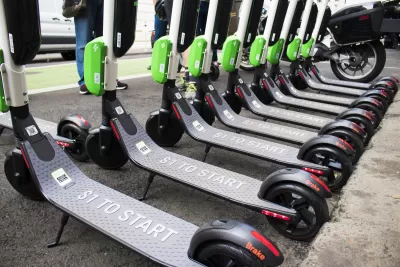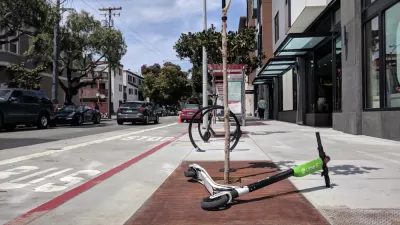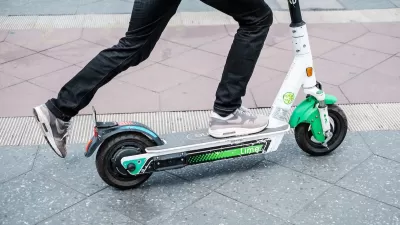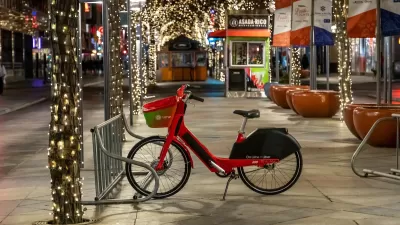A new study indicates that cities across the country are defining and regulating personal transportation devices in very different ways.

In recent years, various micromobility modes have sprung up in cities around the world, along with a flood of news and commentary about scooter safety and regulation, debates about the legalization of micromobility, and who should be responsible for developing policies in this new era of urban mobility.
Much of the coverage looks at incidents and controversies in particular cities. But what are the broader trends in policies and regulations? And is there consistency in the ways that cities are dealing with micromobility? In May, the Mineta Transportation Institute released a report about personal transportation devices—including e-scooters and skateboards—that examines how municipalities are defining PTDs and the regulations they are implementing in their jurisdictions.
"The review of existing regulations in states, cities, and university campuses revealed that PTD users operate in a murky regulatory environment, with rules often poorly defined, contradictory, or altogether absent," conclude researchers Kevin Fang, Asha Weinstein Agrawal, and Ashley M. Hooper. For example, regulation of motorized scooters varies greatly, with some cities requiring riders use them on sidewalks, while others allow them on sidewalks or prohibit them completely.
From a review of the literature and existing regulations and interviews with stakeholders, the researchers recommend that regulatory codes be developed at the state level, though local jurisdictions should have some flexibility and authority to limit use of particular PTDs. In addition, they say that PTDs should be regulated as a class, rather than as individual devices, and that users should be allowed to use both streets and sidewalks under a set of rules that protects all travelers.
Fang and Agrawal discussed the findings of the study during a webinar hosted by the Eno Center for Transportation. The researchers also are making their data files available, which include all the regulatory information and details they collected about PTDs from all 50 states and five U.S. territories, 101 cities, and 20 college campuses.
FULL STORY: Where Do I Ride This Thing? “Rules of the Road” for Personal Transportation Devices (PTD)

Alabama: Trump Terminates Settlements for Black Communities Harmed By Raw Sewage
Trump deemed the landmark civil rights agreement “illegal DEI and environmental justice policy.”

Planetizen Federal Action Tracker
A weekly monitor of how Trump’s orders and actions are impacting planners and planning in America.

The 120 Year Old Tiny Home Villages That Sheltered San Francisco’s Earthquake Refugees
More than a century ago, San Francisco mobilized to house thousands of residents displaced by the 1906 earthquake. Could their strategy offer a model for the present?

Ken Jennings Launches Transit Web Series
The Jeopardy champ wants you to ride public transit.

BLM To Rescind Public Lands Rule
The change will downgrade conservation, once again putting federal land at risk for mining and other extractive uses.

Indy Neighborhood Group Builds Temporary Multi-Use Path
Community members, aided in part by funding from the city, repurposed a vehicle lane to create a protected bike and pedestrian path for the summer season.
Urban Design for Planners 1: Software Tools
This six-course series explores essential urban design concepts using open source software and equips planners with the tools they need to participate fully in the urban design process.
Planning for Universal Design
Learn the tools for implementing Universal Design in planning regulations.
Clanton & Associates, Inc.
Jessamine County Fiscal Court
Institute for Housing and Urban Development Studies (IHS)
City of Grandview
Harvard GSD Executive Education
Toledo-Lucas County Plan Commissions
Salt Lake City
NYU Wagner Graduate School of Public Service





























